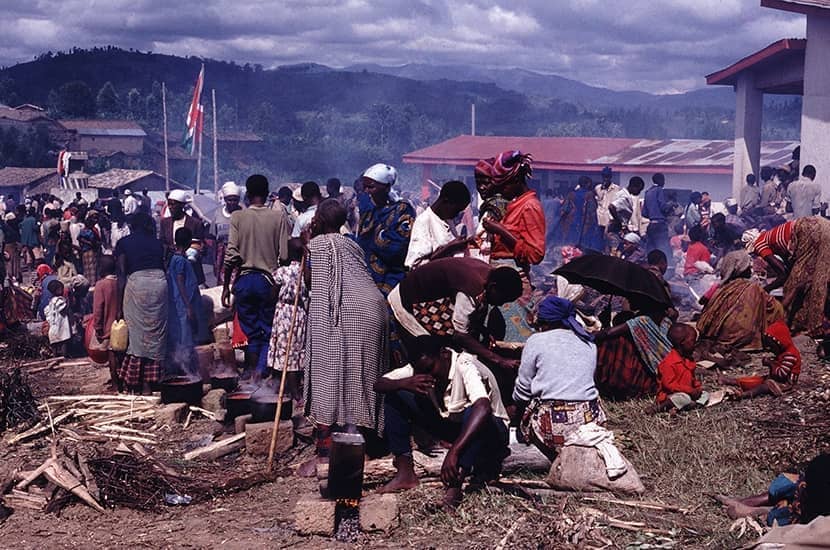Kenya
We were flown around the country, hovering low over mobs using machetes to hack each other up
Each time I sit in St Bride’s on Fleet Street during the memorial of another friend, I look around at the crowds they’ve been able to pull in and feel terribly envious. Riffling through the order of service and then the church’s book of correspondents to find the faces of old comrades, I’m like a man wondering if any guests will bother turning up to one’s own hastily arranged bring-a-bottle party. Our 1990s generation of Nairobi hacks has been severely depleted. While we survivors are not a distillation of complete bastards, it’s natural to feel many of the best have gone before us. Too many were killed young on the story. In later years, the mundane explanations for colleagues’ deaths often seemed to hide the allostatic load and its delayed effects on mind and body. It was the impact of seeing too much for too long but also, of course, of living hard and fast and well and having far too much fun.
Mark Huband, who has just died at the age of 58, was a brave man and an excellent Africa correspondent. By the time he arrived in East Africa, he had already seen the horrors of Liberia’s civil war and he was pitched immediately into Somalia’s anarchy and famine. Personally we were never close and we both found it intensely irritating that many people mistook us for one another, especially given we were such different characters. Professionally we were rivals, but in the violent cauldron of Mogadishu we spent a great deal of time together, ducking into the same craters, taking notes in the same famine camps, and in the evenings sharing bottles and stealing each other’s cigarettes. Mark worked for the Guardian and I was a Reuters man. One of the hardest things about our task in Africa then, as now, was to get editors to take the story seriously. In Somalia during 1992 we reported on the violence, the rise of extremist Islam and the exodus of refugees heading for the West, hoping for intervention that would stem the chaos. But nobody gave a damn, it was hard to get a story in the foreign pages and look at the world today.
In April 1994 we all headed for Rwanda as the mass killings began. I joined a column of Tutsi guerrillas trekking south from the Uganda frontier to Kigali and the bodies were already piling up in the churches, clogging the rivers and stinking in the banana groves. Within days it became clear that things in Rwanda were getting very nasty, on a scale that even the Nairobi hacks had never witnessed. But it was still hard to persuade editors to run the story in the depth it deserved. After all, only a few months before, in the neighbouring Central African state of Burundi, our same group of correspondents had reported on the massacres of tens of thousands of Hutus. One day, the BBC correspondent Mark Doyle and I had somehow persuaded the assassinated president’s pilot to fly us in his helicopter around the pocket-sized country, hovering low over mobs of people using machetes to hack each other up. They didn’t even pause in the killings as we filmed them in the downwash of the chopper’s rotor blades — but our reports hardly made a blip or a blob in the world’s news during those days.
Now as the days and weeks passed, Rwanda did start to attract more international attention and it began to run above the fold. But Mark became deeply frustrated by the Guardian’s apparent refusal to give Rwanda enough space. He was aligned with his paper’s politics — many years later, in the UK’s 2019 elections, he stood as a Labour candidate against Jacob Rees-Mogg in Somerset — but his editors’ neglect incensed him. At the time, it seemed to us that the editors were frightened of covering the genocide in too much depth because they didn’t want a negative story to come out of sub-Saharan Africa during the very same month as Nelson Mandela’s inevitable election victory in South Africa. The view, we believed, was that newspaper readers could take only one story out of Africa at a time and the Guardian wanted it to be a happy one. Mark took the decision to resign from his paper in protest, an incredibly difficult one given that he now had nowhere to file to. But he stayed in the thick of the war and continued covering Rwanda’s bloodbath until the millions of refugees escaped across the frontier into Congo, where they then began dying in multitudes from cholera — and the next phase of Central Africa’s conflicts began. I always admired Mark after that and will remember him with great respect.







Comments